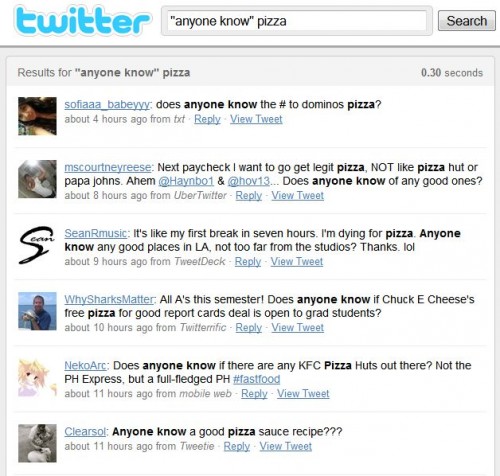The “Anyone Know” Search: How Twitter Is Good For More Than Brand Monitoring
Many marketers understand Twitter search is a powerful way to monitor brand mentions and reach out to customers. But I think few realize what a powerful platform it provides to reach out on non-branded generic mentions. To better illustrate this, let me introduce the “Anyone Know” Twitter search. Actually, I’ll explain “Anyone Know” toward the […]
Many marketers understand Twitter search is a powerful way to monitor brand mentions and reach out to customers. But I think few realize what a powerful platform it provides to reach out on non-branded generic mentions. To better illustrate this, let me introduce the “Anyone Know” Twitter search.
Actually, I’ll explain “Anyone Know” toward the end of this article. To provide the right context for it, I first need to cover the brand monitoring that’s already so well known.
Brand Monitoring On Twitter
Comcast is the classic brand monitoring story, covered over and over again. Comcast watches for customer complaints on Twitter and responds back via Twitter. Great customer service. Got it. In fact, some people have gotten it so often that they’ll groan if Comcast gets trotted out as an example about the power of Twitter.
I’ve personally experience this type of brand outreach on many occasions. For example, I tweeted how bad a Domino’s pizza was that I had recently:
wow @dominos if you were bad before heaven help those people in the past. took chance tried you tonight. awful.
Which promptly got me this response:
So sorry to hear that. Can you let our customer care team know about your experience: https://bit.ly/3vszZ
Nice outreach, and easy for Domino’s to do. I called them out specifically using their Twitter handle of @dominos, so all they had to do was monitor replies to them. Likely, they also run a standing search for any mention of “dominos” or “domino’s” to catch people who might complain about them without using their actual Twitter account name.
One-To-One Vs Many-To-Many
The situation above is one-to-one search marketing, something that we pretty much haven’t had until the arrival of Twitter search. It’s a major reversal of the “search broadcast” system that we’re used to at places like Google.
Consider this:
That’s a search on Google for pizza, with the “natural” or editorial listings showing on the left and the ad listings on right.
Many people search for pizza on Google. Google’s keyword research tool reports 68 million searches worldwide per month involving that word. Many people also seek to reach out to these searchers through the aforementioned editorial and paid listings. Many marketers, reaching out to many seachers — hence my “many-to-many” search marketing characterization
With my Twitter example above, Domino’s found one person via search (me) with a problem and reached out to me directly, hence my “one-to-one” search marketing definition.
One-To-One, Beyond Brands
Are people getting beyond brands and reaching out on generic terms? That would be a killer strategy. It would allows marketers to find people with particular needs, just as people turn to Google with needs, but it would also allow for reaching out to these people personally.
Consider these Twitter results for huntington beach apartments that I found using Google’s real time search service:
In those search results, you can see that several people are talking about actively seeking apartments. If you rented apartments in the city of Huntington Beach, reaching out to these people with a specific offer or invitation to view your rental — done right — would be a helpful, powerful marketing tactic.
It’s also NOT brand monitoring. It’s watching for generic terms, which in the “regular” search world are the Holy Grail that search marketers seek. It’s easy for Domino’s or another brand to rank for their own name. It’s a harder challenge to rank for a generic term, for the generic product they sell — especially if you’re not a well known company.
Generic Monitoring Is Noisy
There’s a problem with monitoring generic terms. It’s prone to a lot of noise. Consider the poor soul at Domino’s who might be told to monitor every tweet mentioning pizza:
That’s seven different tweets in less than a minute all mentioning “pizza.” In an hour, you might be reviewing 500 or more tweets. Many of them will having nothing to do with places to get pizza, such as the person above missing her days of school pizza parties or two other people talking about making pizza.
How do you find the signal from this noise? Now it’s time to meet the “Anyone Know” search.
Anyone Know?
As I’ve written in How We Search With The Twitter “Help Engine”, people effectively “search” on Twitter within their actual tweets when they ask for help from their friends and followers. Sometimes they get answers. Sometimes they don’t. But they definitely ask for help — a lot. You can see this by searching for anyone know on Twitter:
You can see the many calls for help being put out, often several or more within the space of a minute. Just as people “broadcast” their desires by doing searches on Google, so they are broadcasting their need for help on Twitter, if you search for the right terms to locate questions. “Anyone know” is just one example of that type of question-related term (can anyone tell me is another example).
Fine Tuning “Anyone Know” Searches
Lots of questions, but again, lots of noise. That’s where adding terms helps. Let’s go back to that pizza query. Instead of searching for just “pizza,” let’s add it to the phrase “anyone knows,” like this:
Doing that search generates these results:
That’s a nice selection of people who didn’t call out to Domino’s by name but who Domino’s might be able to help. One person wants “legit” pizza — offer them a coupon! Another person wants good pizza places in LA — send them a link to your store locator. Another wants a discount for good grades from a rival chain. Come up with something similar to entice them.
This type of outreach has to be done right. No one wants reply spam. Moreover, people following the main Domino’s account may not want a steady stream of outreach messages to individuals like this. Domino’s might need to maintain a separate account, perhaps something like “DominosAnswers” that would respond to these types of things.
The Twitter Search Revolution
Perhaps many people are already doing this type of outreach on generic terms, and I’ve just missed the stories. Perhaps. However, I suspect most search marketing involving Twitter remains focused on brand-oriented searches. If so, I also suspect that will change.
To me, the ability to reach out to an individual via search and answer their question is a revolutionary addition to the usual search marketing. To understand it even more, I’d encourage you to read my article from last week, The Twitter Search Revolution. That article goes into great detail about the one-to-one reversal I’ve described and the “search broadcast” concept in general. It also covers how, thanks to a growing emphasis on relevancy, Twitter search might soon provide both one-to-one and many-to-many search marketing options.
Contributing authors are invited to create content for Search Engine Land and are chosen for their expertise and contribution to the search community. Our contributors work under the oversight of the editorial staff and contributions are checked for quality and relevance to our readers. The opinions they express are their own.
Related stories
New on Search Engine Land




